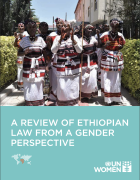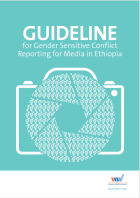1 - 6 of 6 Results
Date:
This quarterly newsletter profiles UN Women Uganda activities and highlights voices of beneficiaries. The Q3 Newsletter covers the period of July to September 2022.
Enjoy the read!
Date:
The assessment offers a series of measures for re forming Ethiopian law to ensure that laws are gender sensitive and more effective at ensuring gender equal ity and non-discrimination. Most notable is that a total of 5 laws or provisions must be repealed in whole or in part; 26 laws must be revised or amended and two (2) new laws must be enacted to bring Ethiopia’s legislative framework in line with its regional and international obligations on gender equality and women’s empowerment. The report also emphasizes the need to prioritize the implementation of national laws that comply with gender equality standards, and in this context, recommends one policy measure to ensure that laws fully deliver on women’s rights
Date:
This module is one of four reports developed on violence in Uganda and the survey is the first of its kind where VAWG, VAM and VAC estimates are linked to poverty and other household socio-economic empowerment indicators such as ownership of household-based enterprises, and other economic indicators.
Date:
Gender Sensitive Conflict Reporting is not an area well developed in Ethiopia. Conflict reporting has either been gender blind at best, or at worst, perpetuated stereotypes, and harmful narratives. UN Women in collaboration with Ethiopian Media Authority has developed a guideline that will be useful as a reference for journalists working in different media. After the development of the guideline, journalists have been trained and the guideline has been disseminated. It is believed the guideline will help journalists to reflect an accurate portrayal of gender in their reporting. It is also designed as a practical and go-to reference guideline.
Date:
This Guideline for Gender Responsive Media published in two languages (Amharic and English) aims to inform and guide media houses, media practitioners, journalists, editors, and anyone in the media and communication sector about ethical reporting of issues related with gender and actions to take to create a gender sensitive media environment both within the media houses as well as in all the contents produced by the media houses
Date:
UN Women in partnership with the Ethiopian Broadcasting Authority (EBA) held a capacity building training on gender sensitive reporting and news coverage to print and broadcasting media practitioners from various regions of the country. This training aimed to enhance the participants’ gender knowledge and to equip them with necessary skills for promoting gender equality and the empowerment of women.





